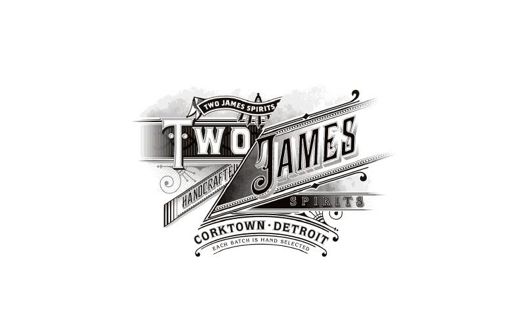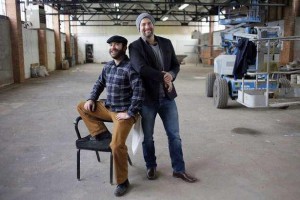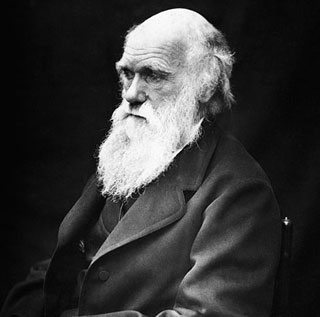As you may have heard, a new distillery will soon be opening in the Corktown section of Detroit, not too far from where our friend Lisa Waud will be opening the new flower shop I told you about a few days ago. From what I’m told, it will be the first legal distillery to operate within the city limits since Prohibition, and, this evening, I had the occasion to interview one of the two entrepreneurs responsible for making it happen… Please join me in welcoming David Landrum, of the Two James distillery.

MARK: Let’s start with the name. Why “Two James”? As neither you, or your partner in this endeavor (Peter Bailey), is named James, I’m guessing that it might perhaps be a reference to Detroit’s distilling history… Am I on the right track?
DAVID: I like that theory Mark, but actually the name is derived from both mine and Peter’s fathers’ names. The story is, as we were sitting in the living room of Pete’s house in Chattanooga (that’s where he was working at the time), writing our business plan, we came to the “okay, so what are we going to call ourselves?” juncture. We ran the gamut of ideas – resurrected distillery names, nautical themes, two syllable words, literary heroes and heroines, figures from Greek and Roman mythology, etc. You name it, we thunk it. And we came up with some really good names. The problem, though, was that they didn’t really mean anything to us besides being really cool-sounding names. Well, the one thing we both had in common was the fact that both our fathers had just recently passed away. This had crossed my mind early on, but I didn’t know how we would incorporate that into our branding. Then I asked Pete what his dad’s name was, and he said “James.” To which I responded, “No shit.” (Obviously this was my dad’s name too.) At that point, we decided on “James and James,” and then it evolved into “Two James.” We liked the ring of it. It was two syllables, and easy to remember and pronounce. But, most importantly, it was near and dear to both our hearts. Oh Damn… Now it’s PERSONAL!
MARK: I’m curious as to what your fathers would have made of this undertaking of yours… Did they appreciate spirits? Were they at all entrepreneurial?
 DAVID: Well, I’m glad you asked, Mark, because I believe their backgrounds fit into the branding better than their names. Both of our fathers were entrepreneurs. Peter’s father hails from England, where he grew up above a pub called “The Dog and Gun” if I’m not mistaken. And, as you can imagine, he was raised with a fondness for spirits, and spent countless hours fraternizing with the locals. He got his degree in mechanical engineering, and, before he passed, he started countless businesses – most of which involved machine parts. He also dabbled in inventing, and had a couple of patents to his name. My father was born in Kentucky, and lived New York before eventually moving with his family to Detroit. He graduated from Salesian high school in Detroit, and went on to get his english degree from Michigan State University. He wanted to be a writer, but unfortunately, with a growing family, he had to put his aspirations on hold and enter the workforce. After working for a few ad agencies, my father ended up starting a marketing company called Phoenix Group, based in Farmington. He did extremely well, but I don’t think he ever let go of his writing bug. That’s what he really wanted to do with his life. However, before he stopped writing, he had some successes to hang his hat on. He wrote jokes for Phyllis Diller and Rodney Dangerfield. (I’m not sure Rodney ever actually used his jokes. I would have to research it a bit further. But Phyllis definitely did.) And he wrote the bulk, if not all, of a comic strip called Thornsby. (Fred McLaren did the illustration.) I still have a bunch of the original art work. As far as drinking goes, he was a conservative drinker who really enjoyed the finer stuff. Scotch was his jam.
DAVID: Well, I’m glad you asked, Mark, because I believe their backgrounds fit into the branding better than their names. Both of our fathers were entrepreneurs. Peter’s father hails from England, where he grew up above a pub called “The Dog and Gun” if I’m not mistaken. And, as you can imagine, he was raised with a fondness for spirits, and spent countless hours fraternizing with the locals. He got his degree in mechanical engineering, and, before he passed, he started countless businesses – most of which involved machine parts. He also dabbled in inventing, and had a couple of patents to his name. My father was born in Kentucky, and lived New York before eventually moving with his family to Detroit. He graduated from Salesian high school in Detroit, and went on to get his english degree from Michigan State University. He wanted to be a writer, but unfortunately, with a growing family, he had to put his aspirations on hold and enter the workforce. After working for a few ad agencies, my father ended up starting a marketing company called Phoenix Group, based in Farmington. He did extremely well, but I don’t think he ever let go of his writing bug. That’s what he really wanted to do with his life. However, before he stopped writing, he had some successes to hang his hat on. He wrote jokes for Phyllis Diller and Rodney Dangerfield. (I’m not sure Rodney ever actually used his jokes. I would have to research it a bit further. But Phyllis definitely did.) And he wrote the bulk, if not all, of a comic strip called Thornsby. (Fred McLaren did the illustration.) I still have a bunch of the original art work. As far as drinking goes, he was a conservative drinker who really enjoyed the finer stuff. Scotch was his jam.
MARK: What can you tell me about the history of distilling in the city of Detroit? I believe I’ve heard that Two James will be the first to operate in the city… at least legally… since Prohibition. Have you had an opportunity to go through the city archives to verify this, and see just how prevalent distilling was prior to Prohibition?
DAVID: Yes, as far as we know, this is true. We dug as deep as we could, and couldn’t find a single distillery in the city that operated after Prohibition…. “legally” that is. The roots of distilling in Detroit were extremely deep before Prohibition. And, during Prohibition, Detroit was a smuggler’s paradise, given that the Detroit River is less than a mile across in some places, and 28 miles long, with innumerable hidden coves along the shoreline, and among the islands. Taken collectively, it’s estimated that the Detroit River, Lake St. Clair and the St. Clair River, carried 75% of the liquor supplied to the United States during Prohibition.
So it’s not an exaggeration to say that distilling in Detroit was huge. There were a plethora of distilleries in and around the burgeoning city. American Liquor Company, Frederick Myll Co., Robinson and Aronheim, etc.. However, none of them were as big as Hiram Walker. Hiram opened his distillery in Detroit in 1858. He started as a grocer in 1830, distilling cider vinegar, and eventually moved on to whiskey. He barreled his first batch in 1854. But, with the temperance movement starting to gain a following, and parts of Michigan becoming dry, Hiram wisely moved his operations a mile across the Detroit River onto Canadian soil, right before the choke hold of the Volstead Act. The rest, as they say, is history. The Canadian Club giant was born. But Hiram was really a Detroiter!
MARK: I’m curious to know how much this rich, often illegal, history is contributing to what you’re doing… or perhaps distracting from it. Are people coming out of the woodwork to bend your ear with stories of the Purple Gang? Are they giving you recipe suggestions based on things that may have been handed down through the generations?
DAVID: Not much, Mark. Honestly no one really knows much about it. We’ve met a few older people from the city who tell tales of their grandparents smuggling whiskey by driving across the frozen river, and stuff like that, but that’s about it. There’s a great dive bar called the Stone House where the Purple Gang used to hang out, and, if you go in there, occasionally you get the local “expert” telling you stories, but we haven’t really run into many people like this. For the most part, people are just really, really excited for a distillery to opening up in the city. As for historic inspiration, I’ve done some extensive research, and have a few ideas of resurrecting some old labels, but I don’t want to give away my secrets just yet.
MARK: To oversimplify a bit, based upon my admittedly rudimentary research into you and your partner, it looks like one of you is a scientist, and the other is a cocktail snob. That sounds to me like an ideal combination for an undertaking like this… but I’m curious as to how you go from the thought – “We’d like to make our own spirits” – to actually doing it. How did you educate yourselves? And, in answering that, if you could share your pre-distillery backgrounds, I’d appreciate it.
 DAVID: Peter got his masters in Sustainable Systems and Design from University of Michigan, and worked for Steelcase, and numerous city governments, before settling on a large carpet manufacturer just outside of Chattanooga, in Georgia. I went to Michigan State for Art History and Studio Art, and wanted to be a professional “fine” artist. So, naturally, I ended up working at my brother’s restaurant, Cafe Felix, in Ann Arbor…. because, obviously, this is what the pursuit of art gets you. (Insert smiley face here.) I was always a wine geek and ended up getting my wine specialist license, but, after a visit to the Milk & Honey bar in NYC, in early 2000, I fell in love with the cocktail. Unfortunately, when I’d first started tending bar in the mid to late 90’s, the newly defined “martinis” were trending. “Appletini’s,” “Chocolate Martini’s,” and the like, were all the rage – syrupy, vapid concoctions that weren’t even close to the actual definition of a martini. And, then, one day, I made a chance visit to Milk & Honey – a little, hidden bar down a dark, dank alley, in the middle of the Lower East Side. Sasha Petraske was making drinks that literally destroyed anything and everything I thought I knew about making drinks. I could go on about this for hours, so I’d better stop here, but let’s just say that I got into it heavy – sculpted ice, homemade tonic, smoker, carbonated cocktail heavy. Because all of these drinks were rooted in the past, the way drinks used to be made, with homemade ingredients, etc., I just naturally progressed to wanting to make my own spirits, because I was making everything else in-house at that point. I remembered the growth in micro-brewing in the 80’s, and I started to see a few small distilleries opening up, and I just thought it would be such an amazing job. I called Peter in Chattanooga one day, and said, “Hey, what do you think about opening a sustainable craft distillery?” and he said “Sounds fun, what do we have to do?” And the rest is history. We took a class in Chicago to see if this was a viable option, or if we were getting in over our heads, and realized that we had a huge upper hand on almost everyone in the class. And that was it. I flew to Chattanooga the next week, and we started work on a business plan.
DAVID: Peter got his masters in Sustainable Systems and Design from University of Michigan, and worked for Steelcase, and numerous city governments, before settling on a large carpet manufacturer just outside of Chattanooga, in Georgia. I went to Michigan State for Art History and Studio Art, and wanted to be a professional “fine” artist. So, naturally, I ended up working at my brother’s restaurant, Cafe Felix, in Ann Arbor…. because, obviously, this is what the pursuit of art gets you. (Insert smiley face here.) I was always a wine geek and ended up getting my wine specialist license, but, after a visit to the Milk & Honey bar in NYC, in early 2000, I fell in love with the cocktail. Unfortunately, when I’d first started tending bar in the mid to late 90’s, the newly defined “martinis” were trending. “Appletini’s,” “Chocolate Martini’s,” and the like, were all the rage – syrupy, vapid concoctions that weren’t even close to the actual definition of a martini. And, then, one day, I made a chance visit to Milk & Honey – a little, hidden bar down a dark, dank alley, in the middle of the Lower East Side. Sasha Petraske was making drinks that literally destroyed anything and everything I thought I knew about making drinks. I could go on about this for hours, so I’d better stop here, but let’s just say that I got into it heavy – sculpted ice, homemade tonic, smoker, carbonated cocktail heavy. Because all of these drinks were rooted in the past, the way drinks used to be made, with homemade ingredients, etc., I just naturally progressed to wanting to make my own spirits, because I was making everything else in-house at that point. I remembered the growth in micro-brewing in the 80’s, and I started to see a few small distilleries opening up, and I just thought it would be such an amazing job. I called Peter in Chattanooga one day, and said, “Hey, what do you think about opening a sustainable craft distillery?” and he said “Sounds fun, what do we have to do?” And the rest is history. We took a class in Chicago to see if this was a viable option, or if we were getting in over our heads, and realized that we had a huge upper hand on almost everyone in the class. And that was it. I flew to Chattanooga the next week, and we started work on a business plan.
MARK: Can you tell me more about the class in Chicago? Is there a school for would-be distillers?
DAVID: Well, I guess, sort of. You will find this a common theme for start up distilleries. It’s a way for them to raise some cash for almost no cost. The distillery will offer a class, usually with the help of a still manufacturer, providing the attendants with sales sheets from the still company and other limited information. Actually, I shouldn’t say that… the information was extensive, but it was more like a chemistry class. They would break down the molecular structure of yeasts, sugars, etc. It was a science lecture, and a boring one at that. The only thing keeping us from falling asleep on our desks was the speaker’s hilariously thick German accent. The technical data was there, but that’s a very, VERY, small part of actually opening a distillery. There were some great things about it, like the emphasis on sensory evaluation, but there was no hands-on component at all, and that’s what we really wanted. We wanted to be slinging grain, carrying boxes, adding yeast, making cuts. The main thing we got out of it was the fact that we walked away with the utmost confidence in our ideas, and our ability to create a better brand and distill better spirits than most of the people in the class. We just saw some horrible grain applications and branding nightmares, and that really got us excited. (Laughing.)
MARK: I know very little about the distillery business, but, if I’m not mistaken, the laws in Michigan, at least a half dozen years ago or so, weren’t terribly conducive to running a successful distillery. Or, at least that’s what I’d heard from Todd Leopold, who, in 2008, moved his distillery, Leopold Brothers, from Ann Arbor to Colorado. His decision was in part due to his landlord jacking up his rent, but, according to Todd, it also had to do with the laws at at the time. “The laws governing spirits sales makes it so we couldn’t sell half of our product line at a new bar (our rum and whiskeys),” he said. “To top it off, self-distribution is legal in Colorado, and that makes all the difference.” So, I’m curious as to what the environment is now. Have things changed for the better in Michigan?
 DAVID: I can’t speak to the exact laws in Michigan back then, but I do know that they were pretty prohibitive. First off ,the cost of having a DSP (Distilled Spirits Producer) license in Michigan at that time was much more expensive than it is now. On top of that (and this hasn’t changed), Michigan is a controlled state, which means that the state sells ALL of the alcohol in Michigan. They even set and regulate pricing. This is pretty tough on small distillers because the profit margins are so small. I won’t get into the nitty gritty, but, basically, if we sell a bottle of spirit at 30 bucks on the shelf in a liquor store, after the state and feds are done with us, we’re lucky to make 6-7 bucks. The one benefit that we DO have in Michigan, though, is that we’re able to make and sell our spirits on site, in the form of cocktails, or bottles to go. This is huge, as our profit margins are significantly higher when we don’t go through a middleman. The Leopold’s could have also done that, though, so I’m not sure what Todd was referring too. Maybe there was a law against barrel-aged spirits at that time, but I’m just speculating. There are other laws up for debate that could positively affect the small distiller in Michigan, such as being able to sell at farmers markets, etc. If this happens, we would be ecstatic. Oh, and I think Todd just really wanted to go home back to Colorado. I know those guys both grew up there, and I think that was always in their sites. I could make a distiller’s joke here about that old adage of “home is where the heart is” but only distilling geeks would get it, and it’s actually not really funny.
DAVID: I can’t speak to the exact laws in Michigan back then, but I do know that they were pretty prohibitive. First off ,the cost of having a DSP (Distilled Spirits Producer) license in Michigan at that time was much more expensive than it is now. On top of that (and this hasn’t changed), Michigan is a controlled state, which means that the state sells ALL of the alcohol in Michigan. They even set and regulate pricing. This is pretty tough on small distillers because the profit margins are so small. I won’t get into the nitty gritty, but, basically, if we sell a bottle of spirit at 30 bucks on the shelf in a liquor store, after the state and feds are done with us, we’re lucky to make 6-7 bucks. The one benefit that we DO have in Michigan, though, is that we’re able to make and sell our spirits on site, in the form of cocktails, or bottles to go. This is huge, as our profit margins are significantly higher when we don’t go through a middleman. The Leopold’s could have also done that, though, so I’m not sure what Todd was referring too. Maybe there was a law against barrel-aged spirits at that time, but I’m just speculating. There are other laws up for debate that could positively affect the small distiller in Michigan, such as being able to sell at farmers markets, etc. If this happens, we would be ecstatic. Oh, and I think Todd just really wanted to go home back to Colorado. I know those guys both grew up there, and I think that was always in their sites. I could make a distiller’s joke here about that old adage of “home is where the heart is” but only distilling geeks would get it, and it’s actually not really funny.
MARK: Go ahead and give it a shot.
DAVID: Alright, alright, don’t say I didn’t warn you. Here’s the background. The result of any distillation, whether it’s corn or wheat or potato or apple, whatever it is, is divided into 3 separate parts. Heads, Hearts and Tails. Ethanol alcohol (what you strive for) evaporates at 78.3 degrees C at sea level, and water at 100 degrees C, but, when you mix those two together, it will evaporate in between 78.3 and 100 depending on the ratio. The more volatile components with lower boiling points will evaporate first (Acetaldehyde, Acetone, Methanol). These are called the “Heads,” and you DO NOT want these in your end product. Acetaldehyde is believed to be a major contributor to the severity of hangovers, Acetone is basically nail polish remover, and 10ml of Methanol will make you go blind and shut down your liver (30ml will kill you). The next part of the distillate is the “Hearts” (the Ethanol), and this is the good stuff. And the “Tails” are at the end of the run, and have the lowest boiling points. The main compounds here are Propanol, Butanol, and Fusel Alcohols. These basically have a range of (usually) negative flavors – bitter almond, petrol, vinegar, etc. Sharp, and sour flavors. These can also later be re-distilled into Hearts… but that’s a different story. So, back to my bad joke: “Home is where the HEART is”… get it? …Zanganuts, that was awful.
MARK: Maybe it’s a better joke after you’ve been sitting around a still for a few days, inhaling nail polish remover. I’m glad that I asked, though. I had no idea that’s how the precess worked… Let’s talk about capitalization. In order to pull this off, you needed a serious influx of cash, and, toward that end, you launched something called the Corktown 500. Essentially, you were looking for 500 people to give you $2,000 a piece, in order to raise $1 million. That $2,000, as I understand it, would get someone a five-year membership in the Corktown 500, valued at $1,750, with the remaining $250 going toward a “refundable barrel-reservation deposit.” And, as members of the Corktown 500, these individuals would get to spend a weekend with you, at what you’re calling “Camp James,” as well as an opportunity to make their own whiskey, discounts on products, events, etc. And, after five years, these folks would either get back $250 and their own barrel, or they’d get $500 in merchandise. Is that pretty much it? Or is there more?
DAVID: That’s pretty much it. The only thing I would clarify is that “Camp James” will be run by us as well as David Pickerell, our consultant and ex-master distiller of Maker’s Mark (he’s the real draw, I mean we’re great and all, but…). Also this isn’t to raise $ 1million, as our costs of hosting this will be at least half of that $2,000.00, and, on top of that, we either give back $500 in merchandise, or $250 in the form of a check. So now we’re basically looking at $500 to $750 in investment capital from each Corktown 500 member, which doesn’t include our labor, future discounts, etc. So, basically, Camp James isn’t seed money at all. It’s something fun that we can do to provide people with a very unique, educational experience, and make them think they’re part of something very special. To compare it, you could take a course at, say, Dry Fly distilling in Washington State, and pay close to $4000 for a couple days with basically no perks, or feeling of being part of the organization.
MARK: So, have people been receptive to the idea of the Corktown 500?
DAVID: People have been very receptive, however we expect it to take off even more once we actually open our doors and people can see how beautiful our space is, how great our product is, and really get a feel for what Two James is all about.
MARK: Do you have other funding outside of the Corktown 500? For instance, have you sought bank financing or the backing of accredited investors? Do you have a fallback plan, should you not be able to raise enough through the Corktown 500 campaign? Have you considered pre-selling product?
DAVID: As I said previously, the Corktown 500 offers nothing to us as far as financing goes. We already have our seed money, which includes some personal investments on both mine and Peter’s part, as well as a line of credit from a financial institution. There is a small investment opportunity left, however, but we expect that to close any day now, as we’ve had amazing support and interest from outside investors.
MARK: Let’s talk about your spirits. What do you intend to offer in your portfolio? And what, in your opinion, makes each distinctive?
DAVID: We will be making a vodka, gin and (what we are really hitting hard) an aged spirit line including a rye whiskey, a bourbon, and a single malt Scotch style whiskey. We also may end up playing with some spirits in-house that don’t make it onto shelves in stores, but you may find them in our distillery, such as Calvados and Absinthe. I have French heritage so I’m a sucker for all those delicious French liquors and liqueurs. As far as what makes them distinctive, you’re just gonna have to come down and taste them for yourself, and tell me what you think!
MARK: How long have you been working on your recipes, and are you confident that you’ve got them where you want them? Or, is there still tweaking to be done before you ramp up production?
DAVID: We are pretty much there with our recipes, but there is always room for tweaking. I think we’ll be tweaking until the day we stop making spirits…. hmm that sounded weird.
MARK: Is the plan still to open in spring of 2013?
DAVID: The St. Patricks Day Parade was our goal about six months ago, but time is drying up, and unfortunately we won’t be able to make that deadline. Sigh…. That would have been such a great time to showcase our spirits to the revelry in the streets, but we’ll just have to wait. We’re still projecting a Spring opening, though. Hopefully it’ll happen by the end of April, but, realistically, if it happened in the beginning of June, I wouldn’t be too surprised. We want it to open of course, but we really want it to be right, and, if that means more time, so be it… BUT DEFINITELY BY JUNE!
 MARK: Why Corktown?
MARK: Why Corktown?
DAVID: Corktown was just perfect for us. There are like-minded individuals in the neighborhood that really want to revitalize the community and help beautify the area. It’s on the upswing and close to downtown, but still has the flexibility of being financially feasible as well as providing us with adequate space. (Distilleries need specific dimensions. They need tall ceilings, no adjacent domiciles, etc.) Besides it being the oldest neighborhood in Detroit, it’s on a major thoroughfare (Michigan Avenue), with fewer zoning restrictions, plenty of parking, etc. Plus, it’s called Corktown. It just sounds badass… Who wouldn’t want whiskey from a place called “Corktown”?!
MARK: You mentioned that you’re working with whiskey-maker David Pickerell, who used to be the Distillery Manager and VP of Operations at Maker’s Mark. How did that relationship come about?
DAVID: It was funny how it happened actually. Pete was talking to one of his friends from Chattanooga who was on an interview in Portland, Oregon, and she happened to be talking to him from this bar. As they were talking, she said, “Hey, there’s this guy next to me that says he’s a distillery consultant, and that you should call him.” Having heard a lot about people offering their consulting services who weren’t really worth a damn, so we just kind of dismissed it and said, “Okay, sure, take his card.” Later, though, we looked him up and started doing research on him, his expertise, and accomplishments, and realized that we needed to talk to him. We soon realized how great an asset he was, hung out a few times, and developed a great friendship. He’s definitely mentoring us and assisting us in our whiskey-making. He invited us to Mount Vernon to work at George Washington’s distillery, and it was priceless. Using the old techniques, with no motorized equipment, wood fired stills, etc. It was hot, humid, smelly, dirty, smokey and perfect… Dave’s worth his weight in gold, and, if you’ve ever seen him, that’s saying something.
MARK: You’ve mentioned in your materials that you’re attempting to source as much as possible locally. Are you having much luck with it? Are all the grains you need available in Michigan? And is the supplier network easy to access as new entrepreneurs?
DAVID: The short answer is no. Because grain is traded as a commodity it’s really hard to source it from a specific farm. We’ve been searching everywhere, and just haven’t come up with a small provider that has the means of harvesting, cleaning, and storing grains for us, especially because we have no track record when it comes to production demands. We can make sure that some of our products are local (like botanicals for gin), but, as far as the grain goes, the closest we can narrow it down to is making sure that it comes from Michigan (but it will probably come from all over the state). As we progress as a business, though, I’m sure it will be easier to narrow our search down, but right now it’s almost impossible. We actually have a potential farm to use in the future so we could actually be “Farm to Bottle” at some point, but the main problem is cleaning and storing. It costs a lot of money, and most small farms don’t have the capability. If you have any leads, though, feel free to let me know!
MARK: What the entrepreneurial atmosphere like in Detroit these days? As new people on the scene, are you finding that there’s infrastructure to support you?
DAVID: The business environment in Detroit is amazing. We’ve had such unbelievable support and enthusiasm about our project from everyone… from city officials right down to the bartender around the corner at the Mercury Bar, who bought us shots when we signed our lease. Honestly, we couldn’t ask for a better situation. Our landlord has been more like a partner than a lessor, the city boards worked with us for countless hours making sure that we knew the exact process of application and permitting, and it goes on and on. We owe a lot to the people that have helped us along the way, and can’t wait to give back to the community, employ people, and add to the revitalization. I couldn’t be more excited about the potential of Detroit.

 For those of you who didn’t notice, I’ve added a link at the bottom of the right hand column. When clicked, it will take you to a page where I’ve started collecting all of our
For those of you who didn’t notice, I’ve added a link at the bottom of the right hand column. When clicked, it will take you to a page where I’ve started collecting all of our  Had a vengeful God not struck him down for heresy, the famed naturalist
Had a vengeful God not struck him down for heresy, the famed naturalist  In September of 2002, I purchased my first, and only, brand new car. I’d always told myself that I’d never buy a new car… as new cars, as we all know, are for suckers… but my old Jeep, which was built from salvaged parts by the kids in a rural Kentucky auto shop class, was on its last legs, and I wanted to demonstrate to the powers that be that there was a market here in U.S. for hybrids. If you can remember back to 2002, there weren’t very many hybrids on the roads, and the analysts were all wondering if they’d actually sell here, as the American people, despite global warming and peak oil, only seemed to want SUVs, which were becoming more obnoxious and ridiculous by the season. (I believe that it was around this time that Cadillac began incorporating “power-retractable assist steps” in their models, as the monstrosities they were creating had grown too large for people to actually enter without robotic assistance.) I called all of the domestic automakers, asking if they would be bringing hybrids to market anytime soon, and I ws told that none of them were. Honda and Toyota, however, had new models on the market, and I chose the Honda Civic Hybrid, which I’m still driving today, 11 years later. The only difference is, instead of getting 42 miles the gallon on average, as it did for the first 10 years of its life, it’s now getting about 26, and every single warning light on the dash is now lit up… And that’s why I’m posting this today.
In September of 2002, I purchased my first, and only, brand new car. I’d always told myself that I’d never buy a new car… as new cars, as we all know, are for suckers… but my old Jeep, which was built from salvaged parts by the kids in a rural Kentucky auto shop class, was on its last legs, and I wanted to demonstrate to the powers that be that there was a market here in U.S. for hybrids. If you can remember back to 2002, there weren’t very many hybrids on the roads, and the analysts were all wondering if they’d actually sell here, as the American people, despite global warming and peak oil, only seemed to want SUVs, which were becoming more obnoxious and ridiculous by the season. (I believe that it was around this time that Cadillac began incorporating “power-retractable assist steps” in their models, as the monstrosities they were creating had grown too large for people to actually enter without robotic assistance.) I called all of the domestic automakers, asking if they would be bringing hybrids to market anytime soon, and I ws told that none of them were. Honda and Toyota, however, had new models on the market, and I chose the Honda Civic Hybrid, which I’m still driving today, 11 years later. The only difference is, instead of getting 42 miles the gallon on average, as it did for the first 10 years of its life, it’s now getting about 26, and every single warning light on the dash is now lit up… And that’s why I’m posting this today.









